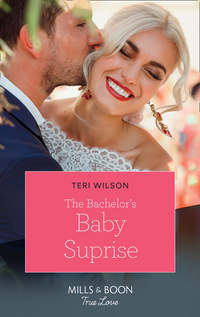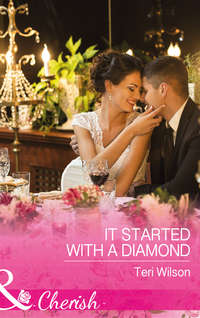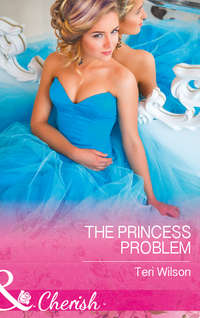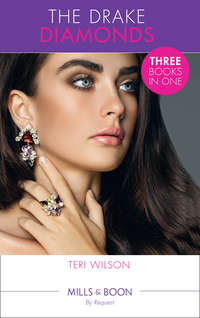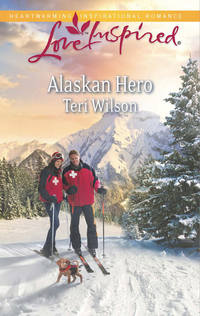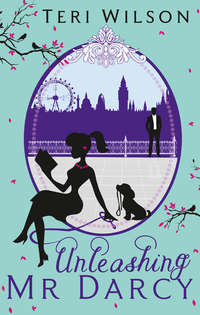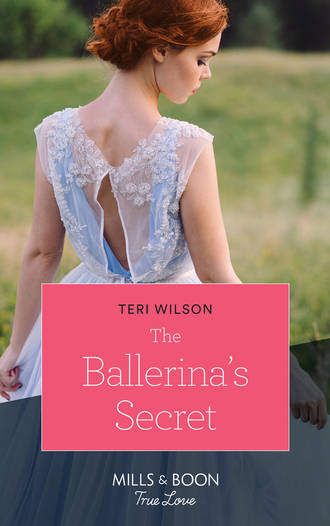
Полная версия
The Ballerina's Secret

Tessa Wilde had a glittering career in front of her...
And then the accident happened.
Ballerina Tessa Wilde had gotten used to hiding her deafness from the world—in fact, she had just landed a role of a lifetime.
If only Julian Shine, brooding piano accompanist, would leave her alone. Or if she could leave him alone.
When he played, she could hear...every note. So was it real? Or was it the music of her heart?
TERI WILSON is a novelist for Mills & Boon. She is the author of Unleashing Mr. Darcy, now a Hallmark Channel Original Movie. Teri is also a contributing writer at www.HelloGiggles.com, a lifestyle and entertainment website founded by Zooey Deschanel that is now part of the People magazine, TIME magazine and Entertainment Weekly family. Teri loves books, travel, animals and dancing every day. Visit Teri at www.teriwilson.net or on Twitter, @teriwilsonauthr.
Also by Teri Wilson
His Ballerina Bride
The Princess Problem
It Started with a Diamond
Unmasking Juliet
Unleashing Mr. Darcy
Discover more at millsandboon.co.uk
The Ballerina’s Secret
Teri Wilson

www.millsandboon.co.uk
ISBN: 978-1-474-07779-8
THE BALLERINA’S SECRET
© 2018 Teri Wilson
Published in Great Britain 2018
by Mills & Boon, an imprint of HarperCollinsPublishers 1 London Bridge Street, London, SE1 9GF
All rights reserved including the right of reproduction in whole or in part in any form. This edition is published by arrangement with Harlequin Books S.A.
This is a work of fiction. Names, characters, places, locations and incidents are purely fictional and bear no relationship to any real life individuals, living or dead, or to any actual places, business establishments, locations, events or incidents. Any resemblance is entirely coincidental.
By payment of the required fees, you are granted the non-exclusive, non-transferable right and licence to download and install this e-book on your personal computer, tablet computer, smart phone or other electronic reading device only (each a “Licensed Device”) and to access, display and read the text of this e-book on-screen on your Licensed Device. Except to the extent any of these acts shall be permitted pursuant to any mandatory provision of applicable law but no further, no part of this e-book or its text or images may be reproduced, transmitted, distributed, translated, converted or adapted for use on another file format, communicated to the public, downloaded, decompiled, reverse engineered, or stored in or introduced into any information storage and retrieval system, in any form or by any means, whether electronic or mechanical, now known or hereinafter invented, without the express written permission of publisher.
® and ™ are trademarks owned and used by the trademark owner and/or its licensee. Trademarks marked with ® are registered with the United Kingdom Patent Office and/or the Office for Harmonisation in the Internal Market and in other countries.
www.millsandboon.co.uk
For Julia, Karen, Holly and Laird Joanna Macpherson, the lady laird of Attadale and Attadale Gardens in the Scottish Highlands, where I wrote the first four chapters of this book.
I can’t wait to go back.
Contents
Cover
Back Cover Text
About the Author
Booklist
Title Page
Copyright
Dedication
Chapter One
Chapter Two
Chapter Three
Chapter Four
Chapter Five
Chapter Six
Chapter Seven
Chapter Eight
Chapter Nine
Chapter Ten
Chapter Eleven
Chapter Twelve
Chapter Thirteen
Chapter Fourteen
Chapter Fifteen
Extract
About the Publisher
Chapter One
The 66th Street station hummed with music on Monday afternoon. Tessa couldn’t hear it, but she could feel the notes vibrating beneath her feet, ever so softly, like a whispered invitation to dance.
It had been a long time since Tessa had actually heard music, or anything else. Over a year. She no longer missed the bustle of crowds, the whoosh of trains or the collective rustling of the morning Times in the underground, but thirteen months hadn’t been long enough to shake the memory of music echoing off the tile mosaics. Sometimes she still dropped a dollar or two in the occasional violin or guitar case propped open on the gritty concrete floor. The street musician would usually smile in gratitude, and Tessa would smile back. Then she’d stand and watch the bow slide quietly over the violin strings until the silence grew painful.
Today, the music found her before she even spotted the elderly man wearing a bow tie and fedora, playing the trumpet beside one of the rust-colored pillars on the platform. Before she felt the hum beneath the soles of her shoes. It reached her first by sight. Specifically, by way of the twitch of her dog’s ears.
Mr. B loved music. As a hearing-assistance dog, he’d been trained to alert her to specific sounds—the telephone, the alarm clock, people calling her name—but recognizing music wasn’t part of his repertoire. Not intentionally, anyway. As best she could tell, he just enjoyed it.
Oh, the irony.
The ground rumbled underfoot as Tessa followed the little dog down the steps and into the station. She’d missed the uptown 1 train by mere minutes, if the near-empty platform was any indication. Other than the trumpet player, she and Mr. B were alone. Tessa gave him a little more slack on his leash, and he trotted straight toward the musician. A jazz player, if she had to venture a guess. He just had that look about him. Maybe it was the bow tie. Or possibly his black-and-white spectator shoes.
She’d worn shoes just like them once—last year, when the Wilde School of Dance had performed a Gershwin tribute. The curtain had gone up on an opening number to Rhapsody in Blue, with sultry movements, which were more reminiscent of Bob Fosse than classical ballet. It had been a novelty, wearing something other than pointe shoes. Tessa’s feet had been grateful for the respite, even though she was back en pointe before the third interlude. Not that she’d minded, really.
Tessa loved pointe shoes. She always had. Some of her earliest memories were made up of watching dancers’ pointed feet in the mirrored walls of her mother’s dance school while she played in the corner. Dance was in her blood. There had never been any question of whether or not she would take ballet class. Ballet was her destiny, and she’d loved it since the beginning. The moment her hand touched a ballet barre for the first time, she’d been hooked.
She fell for dance. Fast. Hard. As abhorrent as she now found that analogy, it fitted.
Then thirteen months ago, she’d fallen again. For real, this time. In a way, she was still falling. Day after day. And night after night, in her dreams.
She swallowed and blinked hard against the memories. She shouldn’t be thinking about her accident. Not now, over a year later, when she’d finally mustered enough courage to put herself out there and go after what she wanted.
When she opened her eyes, she found the trumpet player watching her as he blew into his horn. His eyes were kind, like a grandfather’s. This close, she could see the frayed edges of his bow tie and the threadbare spots on the elbows of his suit jacket. She wondered what song he was playing as she reached into her purse for a dollar bill.
She bent down and tossed it into the bucket at his feet, and when she stood up, she realized a small crowd had gathered. Commuters. Businessmen carrying briefcases. Women in sleek suits. And off to the side, a man with soulful blue eyes and the bone structure of a Michelangelo sculpture. A bit on the intense side. He looked angry, actually. Like a character from a Brontë novel. Heathcliff with a big, fat chip on his shoulder.
And he had an interesting scar next to the corner of his mouth, which enhanced his chiseled features in a way. It made him look less perfect, more human.
An artist of some sort. Tessa would have bet money on it.
But what was she doing staring at a total stranger? Especially one who looked as though he wanted to snatch the trumpet right out of the trumpet player’s hands and break it in two over his knee?
The poor old man. She reached into her bag for another dollar and couldn’t help noticing Heathcliff’s exaggerated eyeroll as she dropped it into the bucket. He shook his head and glared at her.
What a jerk.
Mr. B’s leash suddenly went taut in her hands, and Tessa looked down to find the dog standing at attention, staring in the direction of the platform. The subway car is coming.
After a year, she could read the dog’s body language better than she could read most humans’ lips. At home, one nudge of a paw meant a knock on the front door. Two nudges indicated her cell phone had gone off. Repeated face licking first thing in the morning meant rise and shine.
In public, Mr. B’s cues were more subtle. He hadn’t actually been trained to alert to specific sounds out in the world. But his reactions—even the tiny ones, such as a swivel of his fox-like head or a twitch of his plumed ears—spoke volumes. With Mr. B at the end of his leash, Tessa felt more aware of her environment. Safer somehow.
Inasmuch as Tessa felt safe these days.
She boarded the train, managed to find a spot with a clear, unencumbered view of the digital display of the scheduled stops and tried not to dwell on the fact that the most significant relationship in her life was with a dog. No, that wasn’t quite true. Dance had come first. Ballet was the love of her life. The source of her greatest joy, and as fate would have it, her most profound pain. In short, her feelings for dance were complicated.
Which was exactly how people with normal social lives labeled relationships with other actual humans on Facebook. Perfect.
Tessa sighed. She didn’t want to think about her relationships, or lack thereof, at the moment. If things had been different, she’d be married to Owen right now. She’d be a wife. Possibly even a mother. Maybe someday she still would.
Then again, maybe not.
There would be time for such things later, when her energy wasn’t one hundred percent devoted to rebuilding her career. Love, even friendship. Those things could wait. Couldn’t they?
Besides, she wasn’t technically a hermit or anything. She taught six classes a week at her mother’s dance school. Granted, most of her students were four-, five-and six-year-olds. But they were living, breathing people, with whom she interacted on a daily basis.
Plus she had dancer friends. Sort of. Violet was her friend at least. The two of them had been auditioning alongside one another for years. Long enough to give up any notions of one day becoming primas, or even making it as far as soloist. Which was fine, really. Tessa just wanted to dance. She just had to find someone who would give her a chance.
Keeping up was difficult enough when she could no longer hear the music. She would be grateful for even the smallest moment onstage, even if that moment was spent in the shadows of other dancers. Better dancers.
She knew that was a difficult thing for other people, hearing-people especially, to understand. Which was why she didn’t bother trying to explain it to anyone. Even her own family didn’t seem to get it.
She gave her dog a little squeeze. “It’s better this way, right, Mr. B? Just you and me.”
Mr. B craned his neck and gave her a dainty lick on her cheek.
“Right,” she whispered, but couldn’t seem to shake her air of melancholy.
She shouldn’t have stopped to watch the trumpet player in the station. Being unable to hear a melody she could so clearly see in the movement of a musician’s nimble fingers, in the creased concentration of his brow, had a way of making her more acutely aware of all she’d lost. And she didn’t like to dwell on everything that had slipped through her fingers. Her mother spent enough time doing that on her behalf.
She unzipped her dance tote and pulled out a canvas drawstring bag from Freed of London. She normally didn’t splurge on such extravagant pointe shoes. Her shoes didn’t matter much when she was teaching little girls how to plié all day long. Sometimes she went as long as a week without even dancing en pointe.
Then again, this was no ordinary week. The Manhattan Ballet was holding auditions for the next three days, in preparation for a brand-new ballet. Not just any ballet, but an original piece, choreographed by the legendary dancer-turned-choreographer Alexei Ivanov, the biggest dance star to come out of Russia since Mikhail Baryshnikov. He’d only been choreographing for two years, and already critics were comparing him to George Balanchine.
And he was coming here. To Manhattan. Just a few subway stops away from the very studio where Tessa had been dancing since she was three years old.
Ivanov was the reason for the new shoes. Tessa knew her chances of being selected for one of his ballets were slim to none. But she couldn’t give up. What kind of dancer would she be if she didn’t even try?
The kind of dancer who no longer performed, but only taught classes. That’s what kind.
She didn’t want to be that kind of dancer. Not anymore. The odds were stacked against her, but she couldn’t give up.
Not yet.
She pulled her sewing kit out of the side pocket of her dance bag and managed to get the needle properly threaded on the first try, despite the jostling of the subway car. She’d sewn ribbons on so many pointe shoes that she could probably do it in her sleep. She might have even done just that a few times during Nutcracker season, when back-to-back performances at the Wilde School left the dancers so exhausted, they could barely hold their heads up.
Playing seamstress on a moving train, before the car lurched into her station, would be no problem. With the chore behind her, once she got home, she could ice her feet, take an Epsom-salt bath and head straight to bed.
Because, again, who needs social interaction?
Enough with the self-pity. Tomorrow was important enough that the company dancers at the Manhattan Ballet were probably all planning to get to bed early, too. Even Chance Gabel. Granted, the bed he planned on climbing into likely wasn’t his. But still.
Needle threaded, she anchored it into the cuff of her sweater while she untied the drawstring of the slender bag containing her new shoes. She pulled one out, along with a carefully spooled coil of pale pink ribbon. As she positioned the edge of the ribbon alongside the outer seam of the shoes, Mr. B pawed at her hand.
The shoe fell into her lap. Tessa looked up but didn’t notice anything out of the ordinary.
“What is it?” she mouthed.
The little dog cocked his head and swiveled his russet ears forward. If she hadn’t known better, she would have thought he was trying to alert her to a sound. Some unheard melody that was calling her name.
She glanced at the pregnant woman, who was sitting opposite her, and the pair of Wall Street types, who were standing near the door. No one seemed alarmed, which meant the fire alarm hadn’t gone off or anything.
Tessa ran a soothing hand over Mr. B’s narrow back. Maybe he was tired. She’d leave him at home tomorrow. She obviously wouldn’t be able to drag him along on her audition. The last thing she wanted was to draw more attention to her hearing loss.
But that was okay. She could handle a day in the city without him. She’d have to. It wasn’t as though she had a choice in the matter.
She’d be just fine on her own. In her quiet little world. Alone.
Wasn’t she always?
* * *
Before he even set foot in the subway station, Julian had been less than thrilled by his present circumstances—those circumstances being his growing need for a source of income, despite his fervent lack of interest in leaving his uptown apartment. He’d also just suffered the humiliation of his first job interview in a decade.
Not an interview, technically. Worse. An audition.
For a gig he didn’t even want.
The job started tomorrow, and he still didn’t know if he’d gotten it. But he would. Chance would see to it that he did, and then, as much as he dreaded the idea, Julian would have no choice but to give it a shot.
Not that he had anything against working. He preferred it, actually, to the nothingness that had slowly taken over his days. He’d just thought that when he finally reached the point where the money from his glory days ran dry, he’d do something else. Anything other than music.
Stumbling upon the trumpet player had nudged Julian’s irritation firmly into pissed territory. It was a territory he knew, like a favorite song. He spent a lot of time being pissed lately. A couple of years, in fact. But it was better than the alternative. Julian much preferred being thought of as a bitter, cranky prick than as an object of pity. And if no one ever thought of him at all anymore, all the better.
He cursed himself for letting the trumpet player get to him as he climbed on the 1 train. The guy was just an old man. A nobody.
A nobody who can still play the horn.
Right.
He sank into the last open seat in the subway car, which happened to be directly behind the woman who’d dropped a dollar in the old man’s bucket. No, not one dollar. Two. And unless Julian had been imagining things, she’d only pulled out the second dollar bill after she’d noticed his disapproval of the musician’s performance.
“He wasn’t that good, you know.” Julian aimed his comment at the back of her head.
Hers was a quite lovely head, actually. Piled with waves of strawberry blond hair, pinned up to expose the curve of her graceful neck. She was pretty. There was something poetic about the way she moved. Lyrical, almost. He’d noticed it straightaway on the train platform. And Julian wasn’t prone to noticing such things lately.
His gaze lingered for a moment on a silky, wayward curl winding its way down her back, and he suppressed the urge to twirl it around one of his fingers.
God, what was wrong with him? Had he been shut up in his penthouse for so long that he’d forgotten the rules of simple social interaction? Yeah. He supposed he had.
He cleared his throat and spoke to her again. “I mean, it was nice of you to tip the man. Very nice. All the same, his sense of rhythm was severely lacking.”
Why, oh, why was he explaining himself to a woman he didn’t even know? A woman who didn’t care to know him, apparently.
She didn’t budge. She just sat, staring down at something in her lap, while her dog fixed its gaze at Julian over her shoulder. Cute little dog. Copper and white, with plumed ears that seemed almost comically large in proportion to its dainty head. The dog blinked at Julian, cocked its head and swiveled its huge ears forward so they looked even bigger.
“Anyway.” Julian sighed. “Like I said, it was nice of you to help the guy out.”
He waited a beat, and when she didn’t respond—again—he turned back around. The two of them spent the rest of their journey back-to-back, mere inches apart.
In silence.
Chapter Two
The sound erupted at rehearsal the next day, and it was nothing like Tessa remembered.
She remembered soft, lilting melodies. The winsome whisper of violins. She remembered the patter of balletic feet and the rhythm of her own labored breath during allegro work at center. In, out. In, out. In, out.
She remembered what the swish of a velvet curtain sounded like on recital night, the deafening roar of a standing ovation and the way roses being tossed onto a stage floor sounded so much like heavy snowfall against a windowpane.
And she remembered music. Of course she did. Even now, she could still hum every theatrical flourish of the Swan Lake score from memory. Sometimes she thought she heard songs in her sleep—adagio dreams on good nights and jarring Stravinsky nightmares more often than she cared to admit.
Why shouldn’t her subconscious cling to the songs of her youth? Why wouldn’t her dreams be set to music? Since the moment she’d slipped on her first pair of ballet slippers, Tessa’s life had become a dance. It still was, long after she’d stopped hearing the music.
She could hear it now, though. She didn’t know how or why, but she could. Music like nothing that had touched her ears before. Jarring. Bigger than a symphony. Bigger than sound itself. She felt it, too, much like she always did, but without an ounce of the concentration it normally took. The notes rose up from the wooden planks of the rehearsal room floor, hummed through the soles of her pointe shoes and into her body like an electrical current. She felt alive with it, almost manic.
Maybe she was crazy. Maybe she’d pulled a Natalie Portman and gone full-on Black Swan nuts. God, she hoped not. She’d lost enough since the accident, without adding her sanity to the list.
What in the world was happening, though? Could she be cured? Was it possible for an injury like hers to reverse itself?
Possibly.
The doctors had told her this could happen. But so much time had passed that she’d given up on ever hearing again. She’d made peace with the silence.
The noise in her head was anything but peaceful. She couldn’t focus on what her body was doing. She could barely hear herself think.
Tessa felt a tap on her shoulder as she fell out of a turn. Her legs were moving far too quickly. She could see the other dancers out of the corner of her eye, each with a number pinned to the back of her leotard, just like Tessa. Unlike Tessa, they moved in perfect unison. It was mortifying. Tessa spent extra hours in the classroom at the Wilde School of Dance every night to guard against this very thing. She squeezed in extra practice whenever she could. Perfection would never be within her reach. Other girls might have higher arabesques or nicer feet, but Tessa was determined to keep time with the music as well as, or better than, all of them.
It was just so hard to concentrate with the sudden commotion in her head. She’d wished for her hearing to come back for thirteen long months, but she’d never imagined how overwhelming it would be. Or frightening. She wasn’t even sure it was real.
Why did it have to happen now, in the middle of her audition? Why was she losing her mind today of all days? She stumbled to a stop and found the company ballet mistress, Madame Daria, standing directly in front of her. Frowning.
“Number twenty-eight?” She stared at Tessa.
Tessa nodded. The number twenty-eight had indeed been assigned to her when she’d shown up bright and early for auditions. It was to be her number for the full three days of tryouts.


